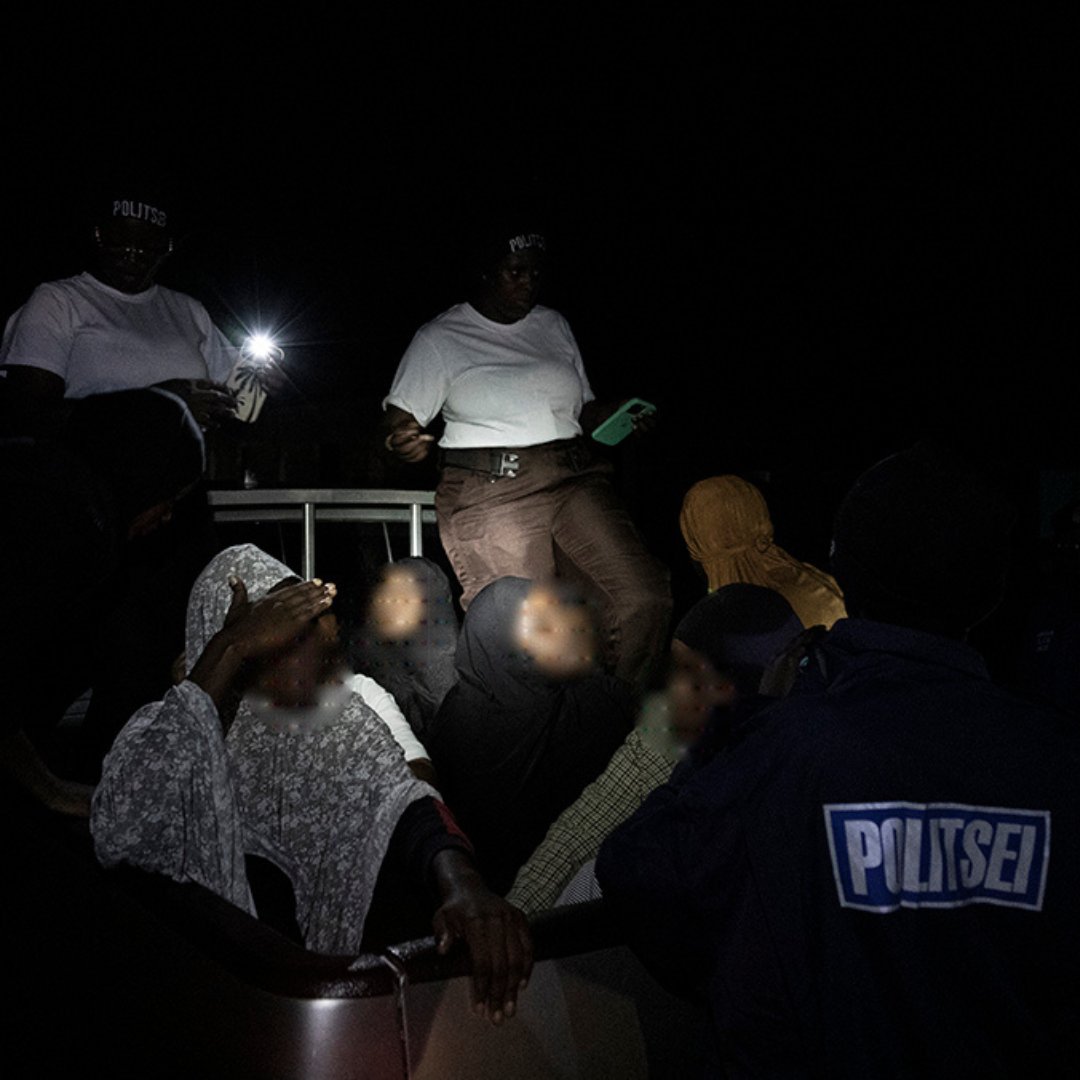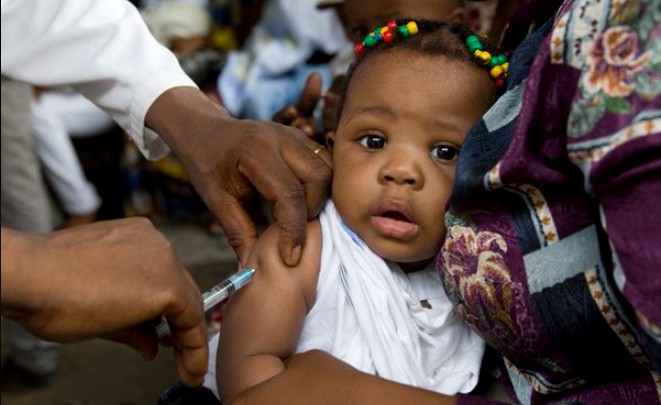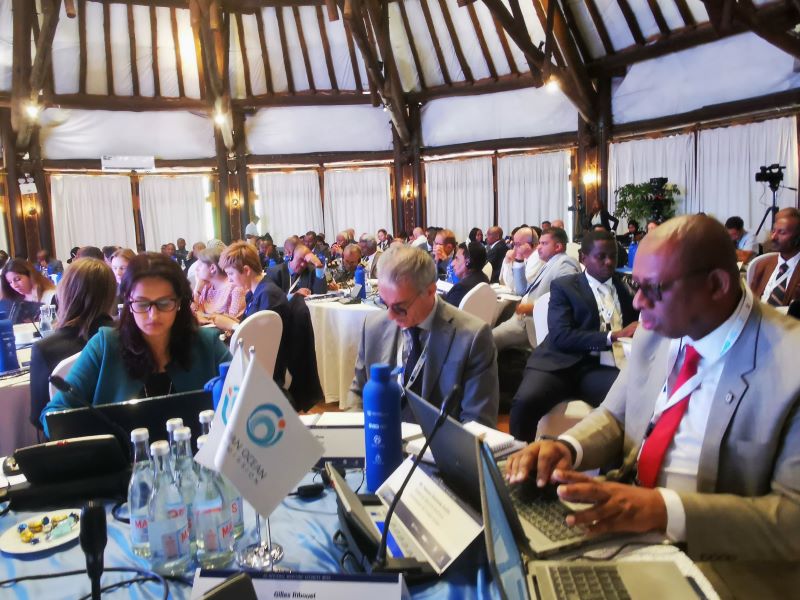Interpol rescues 100 Ethiopian migrants in Nairobi in major anti-human trafficking operation

The victims were found in a four-bedroomed house, from where they were held, beaten, and coerced to ask for money from relatives .
100 Ethiopian migrants were rescued from traffickers' hideout in Nairobi following an Interpol-led operation against human trafficking and migrant smuggling carried out between September and October this year.
A statement released by the organisation on Wednesday said two suspects behind the trafficking were arrested by officers from the Transnational Organised Crime Unit (TOCU) after the victims were found in a four-bedroomed house, from where they were held, beaten, and coerced to contact their relatives for money.
More To Read
- Nairobi concludes EU maritime security week with calls for increased cooperation among partners
- KDF denies allegations of methamphetamine theft in massive 1,024kg seizure off Kenyan coast
- DCI boss Mohamed Amin elected INTERPOL delegate for Africa at General Assembly
- Nairobi firm, directors found liable for trafficking Kenyan student to Myanmar
- Why are so few environmental criminals on Interpol’s ‘most wanted' list?
- Interpol flags online advertisements offering costly crossings into Europe
Operation Liberterra II, which ranks as the largest-ever operation against human trafficking and migrant smuggling, began on September 29 and ended on October 4.
It was carried out across 116 countries and territories leading to the rescue of 3,222 potential victims of human trafficking and identified 17,793 irregular migrants.
"Authorities around the world conducted police raids, reinforced strategic border points, monitored nearly 24,000 flights, and deployed officers to known trafficking and smuggling hotspots. Globally, nearly eight million checks were carried out against Interpol's databases," the organisation said in a statement.
At the same time, a total of 2,517 arrests were made during the week, 850 of which were specifically on human trafficking or migrant smuggling charges.
Coerced into fraud
The week-long operation uncovered dozens of cases in which trafficking victims were deceived and coerced into committing fraud, marking a clear departure from traditional trafficking patterns where human exploitation is the sole criminal objective.
"Targeting online scam centres using human trafficking victims has been an operational priority since Interpol issued an Orange Notice warning its membership of this growing and globalising trend. In many of these cases, victims are lured with false promises of employment and are kept there through intimidation and abuse," the statement said.
In the Philippines, for example, officers raided a warehouse where more than 250 people, mostly Chinese nationals, were running romance scams on an industrial scale. Officers are now combing through seized devices and carrying out interviews to separate the potential victims of trafficking from members of the criminal enterprise.
The revelation matches earlier confessions made by Kenyans who had been rescued from Myanmar where they found themselves working in romance scam centres where they were lured to during their search for jobs abroad.
The operation found that human trafficking and migrant smuggling are increasingly linked to other forms of crime, and that all persons are potential victims of the crime as organised crime groups continue to exploit men, women, and children for their activities.
Organised crime groups
The criminal groups were mainly those involved in drugs, cash, and weapons trafficking, often using the same criminal networks and routes to increase profits and power for organised crime groups, making enforcement more complex.
"In their relentless pursuit of profit, organised crime groups continue to exploit men, women, and children — often multiple times over. While still preliminary, the results of this operation highlight the vast scale of the challenge facing law enforcement, underscoring that only coordinated action can counteract these threats," outgoing Interpol's Secretary-General Jürgen Stock said.
The operation set up coordinating units in Argentina, Senegal, the Philippines, and North Macedonia to assess intelligence and facilitate cooperation between countries within their respective regions and beyond that combined efforts with 15 specialised units from Interpol, partner organisations, national agencies, and NGOs.
"Beyond providing a snapshot of global trafficking and migration trends, the operation served as a vital capacity-building opportunity for countries, fostering relationships between specialised units, and enhancing cross-agency collaboration," Interpol's Executive Director of Police Services Stephen Kavanagh said.
In West and Central Africa, officers uncovered eight separate cases, involving multiple victims forced into exploitative pyramid schemes. Once recruited, they were transported across borders and held against their will, often suffering physical and psychological abuse.
"In one instance, 24 Togolese victims were safeguarded in Mali. The women had been promised employment in locations as far away as North America, but instead, they were charged "recruitment fees" of up to USD6,000 to operate a multi-level marketing scheme. They were then forced to target family and friends to join as well. So far, 10 arrests have been made," the statement said.
In Brazil, an earlier drug trafficking investigation uncovered a migrant smuggling operation led by the same criminal group whose leaders were nabbed for smuggling 70 migrants into the United States and USD750,000 seized from them.
Cash, firearms and drugs
In Serbia, police arrested 12 suspects linked to two organised criminal groups which facilitated the journeys of at least 178 irregular migrants through Serbia to Bosnia and Herzegovina. Police also seized cash, firearms, and drugs.
"Chilean and Paraguayan authorities worked together to break up a polycriminal group involved in migrant smuggling, human trafficking, and money laundering. The group allegedly transported victims into Chile, where they were taken to different cities for sexual exploitation. Four suspects were arrested and 23 victims were rescued and supported," the statement adds.
In Argentina, authorities rescued 59 human trafficking victims, including 14 minors, who were forced to work on fruit and vegetable farms. Officials seized shotguns, pistols, ammunition, and USD 200,000 in cash.
Seven suspects were arrested in Algeria on money laundering charges in connection with organising migrant smuggling. The operation resulted in the seizure of 320,000 dinars (USD2,400) and several cell phones.
In raids on houses, businesses, and nightclubs in North Macedonia, 13 suspects were arrested on charges of human trafficking, drug trafficking, and money laundering.
The 32 potential victims identified during the raids – all women – were mostly from abroad, including Albania, Colombia, Russia, Serbia, and Ukraine.
Vows of poverty and silence
Elsewhere, in Costa Rica, the female leader of a sect was arrested on suspicion of forced labour, child exploitation, and emotional and physical abuse. Those recruited were made to take vows of poverty and silence, while top members lived a life of luxury, with high-end vehicles and multiple properties.
In Syria, authorities identified a group of doctors suspected of organ trafficking as 25 people were arrested in connection with a trafficking ring involved in forced begging in Iraq.
On their part, Ethiopian national authorities arrested a 26-year-old man for recruiting seven victims into domestic servitude in the Middle East, where they were held for weeks, mistreated, and starved.
Top Stories Today














































